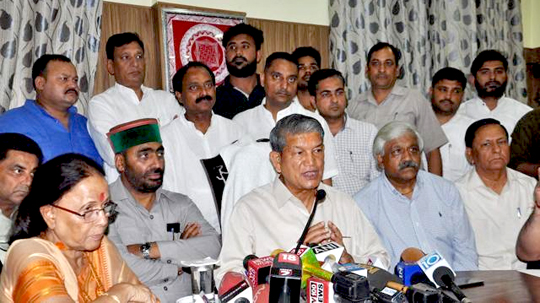New Delhi, Apr 22: The Uttarakhand High Court on Thursday quashed the President’s rule on Thursday, restoring Congress leader Harish Rawat as the chief minister, nearly a month after he was ousted.
The court came down heavily on the central government for its March 27 move to dismiss Rawat under the much-contested article 356 that empowers the union cabinet to impose President’s Rule in a state.
The case “brings to the fore a situation where 356 has been used contrary to the law”, said the bench of Chief Justice K.M. Joseph and Justice VK Bist, adding the article should only be used as a last resort.
“The proclamation of March 27 stands quashed,” said the court in the “status quo ante” order, meaning the previously existing state of affairs was being restored.
Here is what the court said during consecutive hearing since Monday.
-The Governor is not an agent of the central government
-It is the first time in the history of India that a double whammy was being committed under article 356 of hitting the authority of the Governor and the speaker
-In no circumstances can a solitary instance be material enough for imposing article 356.
-There have been instances of thick skinned governments in India lingering on. Besides the option of president rule, is the floor test not the best option to check whether they enjoy majority or not.
-If corruption was to be taken into account, hardly any government would be able to complete its 5 year term in India
-It was said that speaker had taken partisan attitude in case of Arya .It was completely non existential. We are shocked that in a matter which engages the council and the court was a blatant falsehood.
-”Sitting in Delhi, the union cabinet and President cannot rely on anything else than the Governor’s report. What is there in Governor’s report that is speaking of urgency of imposing President rule”.
-”There is no absolutism, President is not King. The President can be an excellent person but he can be terribly wrong, judges can also be terribly wrong”.
Crisis peaked on March 18
The crisis peaked on March 18 when the assembly passed the budget Appropriation Bill by voice vote even as the opposition, including the rebel Congress members, sought recorded voting. But Speaker Govind Kunjwal declined the request, leading the BJP to cry foul.
Rawat was then asked by Governor K.K. Paul to prove his majority on March 28. Just a day before, the central government ousted the Rawat-led government by imposing President’s Rule. Rawat immediately went to court.
On Thursday, Rawat said the ruling to restore his government had begun a “new phase” in the state and asked the Modi government to honour its stated policy of “cooperative federalism”.
Who said what on the HC verdict
The BJP claimed the court ruling was not a surprise.
Its general secretary and Uttarakhand affairs in charge Kailash Vijayvargiya, who played a key role in the developments leading to Rawat’s ouster, insisted that Rawat won’t be able to prove his majority.
“We will prove on April 29 that (the Rawat government) was and is in minority,” he said in New Delhi.
After ouster of Rawat, Vijayvargiya had claimed that Congress-led governments in Himachal Pradesh and Manipur were on their way out -- like it happened earlier in Arunachal Pradesh.
But another senior BJP leader, Subramanian Swamy, slammed Attorney General Mukul Rohatgi and Solicitor General Ranjit Kumar for the fiasco.
“Time to get a new AG and SG for the BJP government... We can win the Uttarakhand case,” Swamy tweeted.
At the end of hectic parleys between top BJP leaders including BJP chief Amit Shah and union ministers Arun Jaitley and Rajnath Singh in the capital, the government decided to move the Supreme Court to challenge the ruling of two-member bench of the High Court.
“We will move the Supreme Court tomorrow at 10.30 am and urge the court to hear the matter urgently,” Attorney General Mukul Rohatgi said.
An overjoyed Congress called the court ruling a victory for democracy and the judicial system “to whom alone aggrieved citizens can turn for relief”.
“The imposition of President’s Rule was unconstitutional,” spokesman Abishek Singhvi said in New Delhi.
Delhi Chief Minister Arvind Kejriwal said the court verdict was “a huge embarrassment to the Modi government”.
“Till now the Modi government used to declare our orders null and void. Today, the high court has declared their order null and void.”
Experts were divided on the verdict’s implications
Former Rajya Sabha MP and noted columnist Kuldip Nayyar said that the “decision is welcome and it will strengthen democratic institutions and constitutional propriety. The ruling makes it clear that Harish Rawat was wrongly removed as chief minister. His position as the leader of the house and the chief minister has been restored now”.
On the other hand, there were others, who disagreed on Rawat’s current status “pending revocation” of the President’s Rule by the governor or the president, and said the court has “recommendation powers” and the executive can abide by it or has the liberty to challenge it in a higher court.






Comments
Add new comment